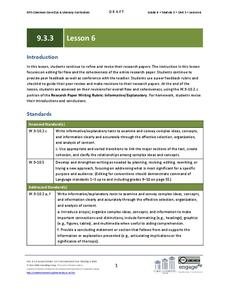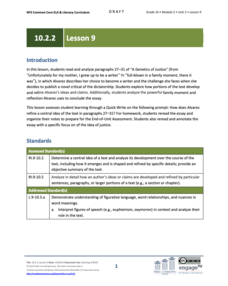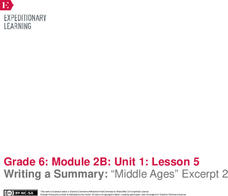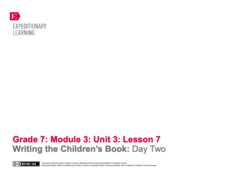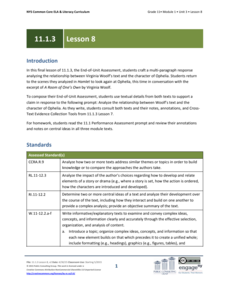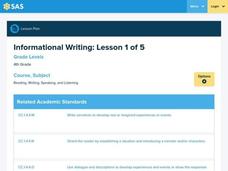Museum of Tolerance
Cultural Research Activity
Class members explore cultural diversity through a variety of texts that showcase the importance of traditions. Then, they interview their family members to research their own cultural background and write their findings on quilt...
EngageNY
Grade 9 ELA Module 3, Unit 3, Lesson 6
The eighth lesson in the editing process focuses on flow and cohesiveness in the entire research paper. Class members examine color-coded pre- and post-revision model paragraphs and then work in pairs to revise and peer-review their papers.
EngageNY
Grade 10 ELA Module 2: Unit 2, Lesson 9
How do authors develop the main ideas in their writing? Pupils consider the question as they read and analyze paragraphs 27–31 from Julia Alvarez's essay "A Genetics of Justice," in which Alvarez describes her decision to become a...
EngageNY
Grade 9 ELA Module 3, Unit 3, Lesson 4
The fourth activity in a unit on crafting a research paper focuses on cohesion within and between paragraphs. Class members examine models that lack cohesion and ones that are cohesive and logically developed before using what they have...
EngageNY
Writing a Summary: “Middle Ages” Excerpt 2
What is the big idea? Scholars use Middle Ages Excerpt 2 to complete a summary graphic organizer. They then use the information from the organizer to write a summary of the text on lined paper. Learners share summaries with the class.
EngageNY
Grade 10 ELA Module 2: Unit 2, Lesson 3
Does trauma have a lasting effect on people's lives? Scholars dive into the topic as they read paragraphs 9–11 of "A Genetics of Justice" by Julia Alvarez, in which the author describes her family's return to the Dominican Republic....
EngageNY
Grade 10 ELA Module 2: Unit 2, Lesson 6
How do authors use rhetorical devices and word choice to emphasize their ideas? Pupils consider the question while reading paragraphs 16–19 from Julia Alvarez's essay "A Genetics of Justice." Readers engage in evidence-based discussion...
EngageNY
Revising for Organization and Style: Exciting Endings
Young writers compose a gripping ending to their historical fiction narratives. Following the previous lesson plan, where learners wrote a bold beginning, class members examine exciting endings from a literary text. They then draft their...
EngageNY
Revising the Informative Consumer Guide: Sentence Structure, Transitions, and Works Cited
Transitions are the glue that link paragraphs together. Pupils listen to a mini lesson plan on sentence structure and transitions and use what they learned to revise their informative consumer guides. Next, they self-assess their writing...
EngageNY
Revising for Organization and Style: Bold Beginnings
Get young writers thinking about how to write a great beginning for their narratives. After examining examples of solid beginnings in literary text, young writers discuss the criteria for a compelling introduction. Then, independently,...
EngageNY
Grade 9 ELA Module 3, Unit 3, Lesson 7
As the unit on research writing draws to a close, class members continue to revise and edit their papers, this time focusing on grammar, spelling, and punctuation (colon and semicolon).
EngageNY
Writing the Children’s Book: Day Two
Following a brief mini-lesson on using dialogue in fiction, young writers continue day two of their writing workshop. They work on the second half of their Children's Book Storyboards, and then they turn and talk with partners to reflect...
EngageNY
Grade 10 ELA Module 3: Unit 3, Lesson 6
And that's a wrap! Scholars create their concluding statement drafts by examining model text with exemplar conclusions. In pairs, they discuss how transitional words and phrases add to sentence structure and consider how their concluding...
EngageNY
Grade 10 ELA Module 4: Unit 2, Lesson 8
Shakespeare's Macbeth has something for everyone. Scholars complete a mid-unit assessment. They craft multi-paragraph essays to analyze how the author's structural choices create tension and suspense in the play's first two acts.
EngageNY
Grade 11 ELA Module 1: Unit 3, Lesson 5
There's a fine line between madness and genius. Using the resource, scholars complete a mid-unit assessment based on their study of Virginia Woolf's A Room of One's Own. They write a multi-paragraph response, analyzing how two central...
EngageNY
Grade 11 ELA Module 1: Unit 3, Lesson 8
How does the theme of gender inequality develop in Virginia Woolf's A Room of One's Own and Shakespeare's Hamlet? Pupils craft a multi-paragraph response to analyze the relationship between the texts. They use evidence from both works to...
Curated OER
Writing-Forming Paragraphs
Fifth graders study how to form paragraphs. In this writing instructional activity, 5th graders discuss why it is important to have paragraphs in their writing. Students also explore the rules writers use to know where to begin a new...
Curated OER
Power Writing to Elaborate: Paragraph Writing, Main Idea
Students are walked through an outline (Power Writing) and shown how to elaborate on a main idea in their writing.
Curated OER
Summer Reading and Writing Assignment: Fahrenheit 451
Twelfth graders explore Fahrenheit 451 by Ray Bradbury. In this reading and writing lesson, 12th graders read the book and think of five books to save from the fire. Students write an essay explaining why they'd save them. The essay...
Curated OER
Basic Paragraph
Explore basic paragraphs. Young writers compose a topic sentence, supporting sentences, and a concluding sentence. This lesson is intended for use with a SMART Board, a software technology web link is induced.
Curated OER
Bumper Stickers: A Matter of Focus
Honk if you love bumper stickers! Long used as a persuasive tool, bumper stickers are used to launch this study of persuasive writing. Each class member is given a bumper sticker and asked to formulate three questions the strip might...
Curated OER
Car For Sale!
Car For sale! In this GED prep lesson, writers develop a classified advertisement to sell a car. After a discussion of precise words and phrases, telling details, and sensory language, sellers draft their ad for review, revision and...
Curated OER
Creative Writing - Getting Ideas
Learners examine the procedures that writers utilize to obtain and develop ideas for writing. Journal writing is fostered as a primary step in the writing process. Learners are encouraged to pay careful attention to using complete...
Pennsylvania Department of Education
Informational Writing
Emerging writers identify an informational piece of writing. They are provided with examples of informational writing and view a PowerPoint on narrative writing. Then, they design their own informational writing with a brochure,...

